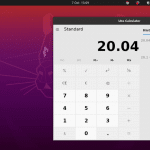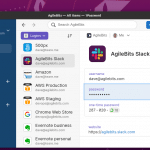Who wants to be a cyborg? Quite a lot of people it seems

Would you be willing to have technology implanted in your body? A survey by marketing and communication tool Tidio reveals the extend to which people are open to 'biohacking'.
More than 75 percent of respondents say they are willing to implant a microchip for health monitoring, and 57 percent are eager to go further and transfer their consciousness to a machine or a different body and live forever as cyborgs.
Fedora 35 Beta Linux distribution with GNOME 41 now available for download

Today is finally the day many of us have been waiting for -- Fedora 35 has officially reached Beta status, and you can download the pre-release operating system immediately. For many Linux users, Fedora is considered the best distribution based on that open source kernel. Why? Well, the distro focuses on truly free and open source software -- a pure Linux experience. It is also fairly bleeding edge, while at the same time, remaining stable enough for daily use.
What makes Fedora 35 Beta so exciting? This pre-release version of the upcoming operating system uses the brand-new GNOME 41 as its default desktop environment. GNOME 41 is notable for having significant performance improvements when using Wayland. Speaking of Wayland, Fedora 35 Beta will run faster when using it with an NVIDIA GPU. Plus, version 35 Beta gets NVIDIA with XWayland, for an improved experience when using apps that aren't designed for Wayland.
Open source Kodi 19 Matrix-based LibreELEC 10 Linux distribution available for download

Kodi is a wonderful open source media player that provides users with an immersive experience that is optimized for the living room. While the software gets a bad reputation because some (most?) people use it for piracy, many strictly use it for legal media consumption. As more and more illegal Kodi add-on maintainers face legal trouble, and streaming services like Netflix, HBO Max, and Disney+ remain competitively priced, fewer folks are seeking pirated content nowadays.
LibreELEC is a Linux distribution that exists solely to run the aforementioned Kodi. It supports many hardware configurations, including traditional x86_64 for PC and some ARM devices like the Raspberry Pi 4. And now, a stable version of LibreELEC 10 becomes available for download. Sadly, support for the Raspberry Pi 0 and 1 is now discontinued.
Silicon Power launches Superior Gaming microSDXC card for mobile gamers

Every once in a while, a manufacturer will release a memory card that is branded for gaming. Consumers often wonder if there is anything different about these cards that will truly benefit gamers. The answer is largely no. A storage card that is designed for gaming is really just marketing hype. Sorry, but it's true.
With all of that said, today, Silicon Power launches what it calls a "Superior Gaming" microSDXC card. While it is intended to be used for the Nintendo Switch, it should also be a good choice for mobile gamers using an Android phone or tablet. The card will, of course, also work with any device that uses such a card, including Raspberry Pi, drones, digital cameras, and more.
Fedora Linux 34 available for download

Woo-hoo! Today is officially the day many of us have been waiting for. Yes, Fedora Linux 34 is finally available for download. For many Linux users, Fedora is considered the best overall operating system to be based on that open source kernel. The distro focuses on truly free and open source software -- a pure Linux experience. It is also fairly bleeding edge, but at the same time, it remains stable for everyday use.
What makes Fedora 34 so exciting? Well, this version of the Linux-based operating system uses GNOME 40 as its default desktop environment, and version 40 is the most electrifying version of GNOME in years. GNOME 40 is notable for a horizontal workspace switcher and having the Dash (favorites launcher) moved to the bottom of the screen. Despite being released last week, Ubuntu 21.04 fails to comes with this version of GNOME.
Linux could run on Apple M1 chips in just a few months

Apple's latest M1-based range of laptops and desktops has impressed many with the impressive speed boost over Intel chips. While many macOS fans have been eagerly waiting for their favorite apps to be ported across, others have been waiting to the arrival of Linux.
And with the launch of version 5.13 of the Linux kernel, this should become a reality. The hard work of developers means Linux support could be coming to M1 Apple devices as soon as June this year.
Fedora Linux 34 Beta with GNOME 40 is here

Oh my. Today is officially the day many of us have been waiting for. Yes, Fedora Linux 34 has officially achieved Beta status, and you can download it immediately. For many Linux users, Fedora is considered the best overall operating system to be based on that open source kernel, and I happen to agree. The distro focuses on truly free and open source software -- a pure Linux experience. It is also fairly bleeding edge, but at the same time, it remains stable for everyday use. Hell, even the inventor of Linux, Linus Torvalds, uses Fedora.
But what is so exciting about Fedora 34 Beta? Well, this pre-release version of the upcoming operating system uses GNOME 40 as its default desktop environment, and version 40 is the most electrifying version of GNOME in years. GNOME 40 is notable for having a horizontal workspace switcher and having the Dash (favorites launcher) moved to the bottom of the screen.
Lexar launches NM620 M.2 2280 PCIe Gen3x4 NVMe SSD

There are many companies producing quality solid state drives these days in various capacities, speeds, and form factors. SATA variants are perfectly fine, but NVMe models are significantly faster. If your computer has an M.2 slot and supports NVMe, you should consider replacing your current SATA drive with one.
Today, Lexar releases a new solid state drive that looks to be pretty solid. Called "NM620," this M.2 2280 PCIe Gen3x4 NVMe SSD is not only fast, but rather affordable too.
Satechi launches USB-C On-the-Go Multiport Adapter for Windows, Mac, and Chromebooks

There are a ton of portable USB-C docks on the market these days, and for the most part, they all do pretty much the same thing -- they turn one USB-C port into several other ports. Of course, the ports offered can vary from product to product, as can the design and overall quality. In fact, a low-quality dock can actually damage your computer -- Apple had to issue a macOS patch recently to protect against that very thing.
Satechi products are always high-quality, so if you are in the market for a dock, you can definitely trust its offerings. Today, that company launches its latest portable USB-C dock, and it looks great. The "USB-C On-the-Go Multiport Adapter," as it is called, offers a lot of expandability, including both VGA and HDMI for video. It even comes with two removable cables -- one of which is very short and can be stored inside the dock for ultimate portability.
NoMachine 7 is a major update to the remote desktop tool

At the moment, thanks to COVID-19, more and more people have been forced to work remotely, but it is a work practice that is being coming increasingly common regardless of whether there is a pandemic or not. But it can be difficult to find a remote access tool that provides everything you need, particularly if you are working across multiple platforms.
NoMachine 7 goes far beyond the capabilities of many remote desktop tools in being available for Windows, macOS, Linux, Raspberry Pi, Android, iOS and ARM. With just about all bases covered, this latest version introduces not only an updated look, but also makes setting up remote sessions easier than ever.
Canonical shares release schedule for Ubuntu 21.04 Hirsute Hippo

It's only a week since we saw the release of Ubuntu 20.10 Groovy Gorilla, and now Linux-luvvie Canonical has shared details of the follow-up -- Ubuntu 21.04 Hirsute Hippo.
The newly published release schedule shows that work kicks off today with the toolchain upload. There are a number of key dates to look forward to, including a beta release on April 1, 2021 and the final release just three weeks later.
Linux 5.10 is a bigger kernel release than expected and sees the removal of setf_fs()

With first release candidate of version 5.10 of the Linux kernel now available, Linus Torvalds says that it "looks to be a bigger release" than he expected.
Linux kernel 5.10-rc1 includes 14-15,000 merge commits -- depending on how you count them -- Torvalds notes in his weekly update to the Linux community. He shares the news that, for him, the most interesting change in this release is the removal of the setf_fs() addressing tool.
How to install Microsoft Windows Calculator on Linux

Microsoft is no longer an enemy of the Linux or Open Source communities. Believe it or not, the Windows-maker is an ally these days. Shocking, I know, but totally true. Linux is now built into Windows thanks to WSL, and Microsoft has several apps available for Linux.
The company has even made some of its apps open source as well. For instance, back in 2019, Microsoft released the source for Windows Calculator on GitHub. And now, that calculator app has been ported to Linux by Uno Platform. Best of all, its insanely easy to install as it is packaged in Snap format.
Get 'Linux Administration Cookbook' ($35.99 value) FREE for a limited time

Linux is one of the most widely used operating systems among system administrators, and even modern application and server development is heavily reliant on the Linux platform.
The Linux Administration Cookbook is your go-to guide to get started on your Linux journey. It will help you understand what that strange little server is doing in the corner of your office, what the mysterious virtual machine languishing in Azure is crunching through, what that circuit-board-like thing is doing under your office TV, and why the LEDs on it are blinking rapidly.
1Password finally comes to Linux -- Ubuntu, Debian, Fedora, and more!

If you aren't using a password manager to both create and store your various online passwords, you are doing yourself a great disservice. True, storing your passwords in the cloud seems counter-intuitive, but in reality, it is far more secure than re-using passwords or writing them down. Make sure you are also using Two-Factor Authentication (2FA) whenever possible too.
On the desktop, there are many password managers for Windows and Mac, but on Linux, things are far more limited. For instance, 1Password is arguably the best password manager in the world, yet despite a decade of requests for it to come to Linux, it never did. Sure, Linux users could use the 1Password X browser plugin, but there was no native Linux version. Well, folks, this is no longer true -- as of this month, developer Agilebits has finally brought 1Password to Linux as a development preview!
© 1998-2025 BetaNews, Inc. All Rights Reserved. About Us - Privacy Policy - Cookie Policy - Sitemap.